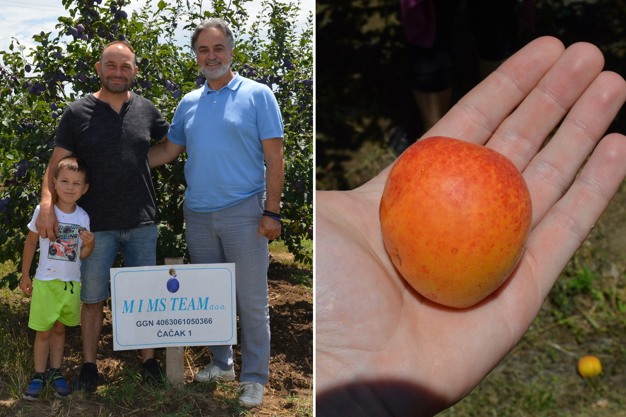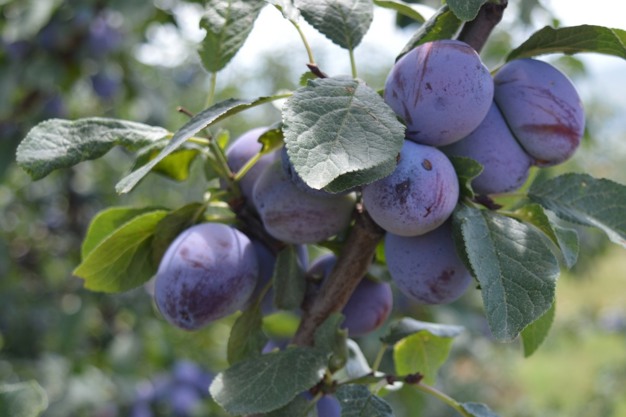Cold, wet weather and frost during this year's flowering period seriously affected the cultivation of stone fruit in the Serbian orchards in Cacak, Ljubovija and Osecina. According to the latest harvest forecasts, the plum harvest will be 25-30 percent below last year's level. The first fruits of the early variety Rana were harvested in mid-June, followed by the main variety Lepotica in the week 26/27. "We expect an overall smaller harvest, but with high Brix values," says Dejan Stepanović, general manager of MIMS Team doo.
The company was founded in 2007 and markets the products of fruit plantations from the regions of Cacak, Ljubovija and others. The company's main export product is the plum, which is used both as a fresh and as an industrial fruit. „Until about seven years ago, 90 percent of the export volume ended up on the Russian market, and only a tenth in the rest of Europe. Today, the division is quite reversed", says Stepanović. Important export markets are Germany, Austria, Italy and France. When it comes to frozen fruit, Germany, Austria and France are still the most important sales markets, explains Stepanović.

Dejan Stepanović (right) is the general director of Mims Team doo, a company based in Ljubovia, which deals with the cultivation and distribution of fresh and industrial fruit.
Right: Freshly picked 'Donaurose' apricot. The apricots are mainly used industrial processing, which are afterwards placed in the EU market as deep-frozen apricot halves."
A growing discrepancy between production costs and producer prices are similar to many other regions in Europe, fruit growing in Serbia is also facing the consequences of climate change. Stepanović: "The water shortage here is not as serious as in Spain, for example, but our irrigation wells now have to be dug deeper than seven or eight years ago. Protection networks, technology, equipment, irrigation systems and others are partially subsidized by the Republic of Serbia and other funds. We have not yet installed any weather protection solutions on our plantations."
Harvest and further manipulation of fresh fruit is difficult due to the great fluctuation of the workforce that moves seasonally from one type of job to another, choosing easier and better-paying jobs, which again causes instability in the harvest itself and beyond. "To remain competitive on the EU market, it is necessary to animate the workforce with higher wages and working conditions and on the one hand, by changing the range of plum seedlings which will be harvested in September or maybe even in October of the current year."
Particular attention should be dedicated to advanced technologies of modern fruit keeping in warehouses with extended shelf life and then marketing the fresh fruit in the region and EU. "All these measures would reflect on the competitiveness of Serbia in the EU market, making Serbia the same level to the producers from Bosnia and Herzegovina, Poland, Hungary and Moldova."

The Serbian plum season started with the harvest of the variety Cacanska Lepotica, while the picking of the later variety Stanley starts a few weeks later.
New varieties and storage technology
The export company Mims Team doo has now set itself the goal of extending the plum season using sophisticated storage technology. "With modern solutions such as SmartFresh, we have already managed to extend the storage period and late delivery. Furthermore, we plan to add new late varieties such as Presenta, Haroma, Top and Empress to the portfolio. But at the same time, we notice that some varieties have lower yields compared to other European countries, which is again a consequence of the microclimate which currently dominates the Balkans and Serbia. However, we must think about such innovations: we want to expand our marketing focus for deliveries to a total of four months in the future so that we can continue to assert ourselves as an interesting export partner", Stepanovic concludes.
For more information:
Dejan Stepanović
M I MS TEAM doo
Valjevski put 262
15320 Ljubovija
Telefon: +381 15 552 031
E-Mail: [email protected]
www.mimsteamdoo.rs
Mrs. Anneliese Vollweiler
Anevo Trading GmbH
Tel. +49 (0)170 581 7970
www.anevo-trading.com
